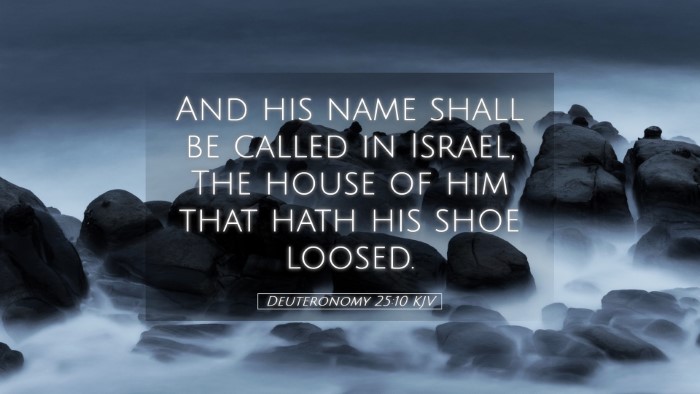Exegesis of Deuteronomy 25:10
Verse: "And his name shall be called in Israel, The house of him that hath his shoe loosed."
Introduction
Deuteronomy 25:10 offers a glimpse into ancient Israelite customs regarding justice and social standing.
This commentary synthesizes insights from several public domain scholars to provide a comprehensive understanding of this verse and its implications for pastoral care, theological study, and ethical living.
Contextual Background
The verse is situated within a larger discourse concerning laws related to marriage, inheritance, and litigation. Specifically, it addresses the circumstance where a man refuses to fulfill his levirate duty to marry his deceased brother's widow, allowing for a public and profound expression of shame and accountability through the symbolic act of shoe removal.
Historical and Cultural Significance
-
Levirate Marriage: This custom was rooted in the preservation of family lineage and property rights (Deuteronomy 25:5-6). The refusal to participate was not simply a personal affront, but a denial of duty that affected the entire family and community.
-
Symbolism of the Shoe: In ancient Near Eastern practices, shoes symbolized one’s rights and possessions. The act of loosing a shoe represented a forfeiture of claims and an open admission of shame (Barnes).
Theological Implications
The broader theological implications of this verse are significant. It highlights the importance of communal responsibility and the lengths to which individuals should go in honoring familial obligations. The "house of him that hath his shoe loosed" becomes a symbol not only of personal failure but a communal resolution to uphold the divine order established through covenantal relationships.
Moral and Ethical Considerations
-
Responsibility to Family: Presenting a social expectation that individuals uphold commitments to their family and community is vital, challenging contemporary readers to evaluate their own commitments (Clarke).
-
Public Accountability: The public nature of the shame points to an ethical framework where accountability is shared within the community. This structure underscores the notion that individual actions bear communal consequences (Henry).
Commentary Analysis
Matthew Henry's Perspective
Matthew Henry emphasizes the cultural and moral dimensions surrounding the levirate marriage. He notes that the refusal to marry the widow not only incurs personal disdain but also places a generational stain upon the families involved, affecting how they are remembered in Israel.
Albert Barnes' Insights
Albert Barnes provides a detailed examination of the word imagery in the Hebrew text. He underscores the significance of loosing the shoe not just as an act of defiance, but as a symbolic gesture pointing toward the relinquishing of rights and responsibilities, thus presenting a broader theological understanding of claims and obligations before God and man.
Adam Clarke's Contribution
Adam Clarke adds depth by paralleling this act with other biblical instances of shame and public rebuke. He discusses how this reflects God’s law working in society, serving not just to punish but to instruct on the importance of duty and the weight of communal honor.
Conclusion
Deuteronomy 25:10 serves as a profound reminder of the intertwining of personal morality with communal ethics in the life of faith. The insights gathered from the commentaries of Henry, Barnes, and Clarke remind pastors, students, theologians, and Bible scholars of the necessity of understanding historical context, cultural significance, and thematic implications for contemporary application.
As we reflect on this verse, we are called to examine our own responsibilities within our communities and the faith we profess, recognizing that our actions have lasting impacts that transcend ourselves.


